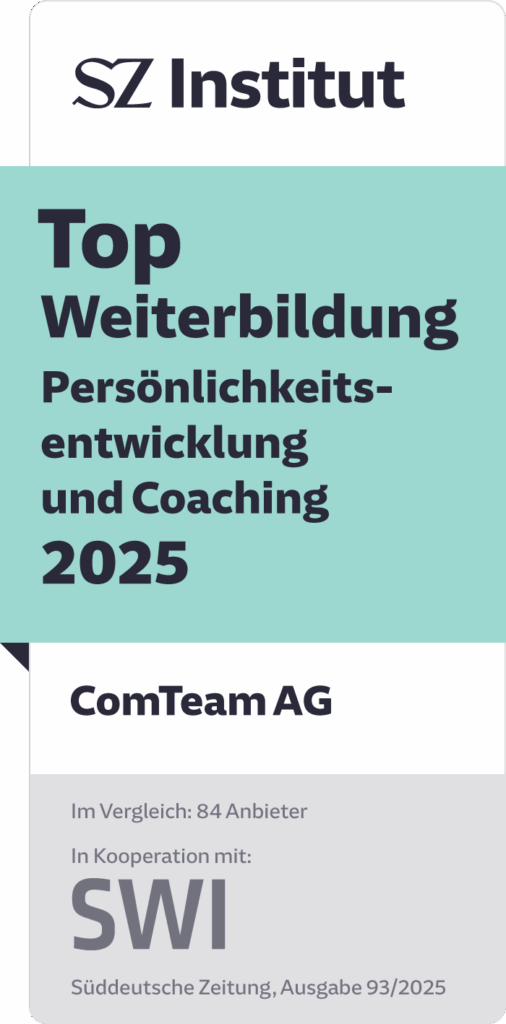That is your focus ...
Your are searching for ...
Excellent

Ausgezeichnet

Our fields of expertise
Discover
ComTeam AG | Academy + Consulting
Bergfeldstraße 11
83607 Holzkirchen, Germany


ComTeam AG | Academy + Consulting
Bergfeldstraße 11
83607 Holzkirchen, Germany
As often as we can, we conduct studies that deal with a wide range of theories relating to corporate culture. These studies have added value for you – and for us. This is because the results provide a reliable picture of the perceptions that many of us and you collect in our daily working lives.
Here you can find everything you need to know about the ComTeam studies – both the latest 2021 study “To be or not to be … me.” as well as all other study reports.
Please note that our study reports are only available in German.
Enjoy discovering and reading!

The ComTeam Study 2021 on authenticity in the workplace – in times of dissolution of boundaries, new work and digitalisation.
The ComTeam STUDY 2020 on the working world of the future and values in the new normal.
Enjoy our results report!
Download: study report 2020 (german)
The 2019 ComTeam management study on learning environments and corporate culture in the digital transformation
Many – especially younger people in companies – are now demanding more personal responsibility, more influence on decisions and more say in developments.
After all, they are predominantly the ones who are “natively” at home in the world of agility, digitalisation and globalisation, the world of holocracy and start-up culture – and who therefore hold the keys to transforming their organisations.
But how serious is this desire? Is it primarily about gaining more room for manoeuvre or is it also about taking on the associated responsibility? How willing are the managers concerned to actually hand over power and responsibility? And who benefits from this shift in the end?
How willing and eager to change do you think your company is?
In the ComTeam Study 2015, we asked more than 450 managing directors and board members as well as managers and employees how they feel about change in their own company. What about the willingness to change and change management skills? Which topics are associated with change, what generally goes well and, just as importantly, where are there problems?
It should be said in advance: the results do not trigger cries of joy. But change management can be learnt. Companies are advised to do so, because if you believe the trends, the intensity of change will not stagnate or even decrease in the coming years – no, it will only reach its peak. You should be prepared for this!
Topics, formats and enthusiasm factors for the training and development of managers
Many industries and areas are subject to constant change, tasks within a company can change and positions can change. “Lifelong learning” is the result if specialists and managers want to be able to constantly meet new requirements.
But how is this learning organised? How must further training be organised in the 21st century in order to appeal and have a lasting effect? Which formats and topics are interesting? What developments are emerging?
As part of the eleventh study, ComTeam AG asked precisely these questions and focussed on the topic of further training for managers. The results provide personnel developers, who make up around 30% of the study participants, with an indication of what is important to managers when it comes to their own training.
Do personality factors influence the economic success of a company?
Personality factors are by no means purely a private matter. Skills such as communication skills, openness and empathy as well as self-reflection and mindfulness are highly relevant for the economic productivity of a company. Nevertheless, they are still overshadowed by so-called “hard skills”, i.e. typical professional qualifications such as knowledge gained through studies, training or experience. But is this really all that matters for managers?
We asked how managing directors and board members as well as managers and employees rate themselves and their colleagues in terms of soft factors, where there is room for improvement and whether these qualities have a direct influence on the success of a company. The results surprised even us “old hands” in this business.
Download: study report Persönlichkeit und Produktivität (german)
Corporate culture is becoming increasingly significant. Internationalisation, globalisation, intensified competition, and change processes are bringing so-called soft facts to the forefront of a company’s strategic direction.
The ComTeam study delves into satisfaction within the various fields of corporate culture, asking how these aspects fare in organisations. We wanted to know how these areas perform in practice, where things are balanced, and most importantly, where there is a need for improvement in terms of competitiveness and success.
Have companies recognised the importance of a vibrant corporate culture for economic success, and are they prepared for a future where both hard and soft factors play a role?
Download: study report Erfolgsfaktor Unternehmenskultur (german)
In the tension between regulation, virtualisation, and the battle for talent
The demands on leadership have increased in recent years due to crises, scarce resources, demographic developments, as well as regulation and virtualisation.
With the ComTeam study, we explored how much room for manoeuvre leaders have within the scope of virtual leadership, between lean management, corporate governance, and compliance requirements, or the competition for young talent. We wanted to understand what these influences mean for contemporary leadership, where the opportunities lie, and where the risks are.
Download: study report FührungsRaum (german)
Middle management is neglected, managers in the “sandwich position” have too many tasks and too few competencies, they are dissatisfied and unmotivated…?
These are all statements and buzzwords about middle management leaders. But is this really the case? What is the situation of middle managers, and how satisfied are they with it? What are their skills, what do they want, and where are their strengths or weaknesses?
The ComTeam study delved into these aspects – we asked not only middle management themselves but also young and top leaders within companies.